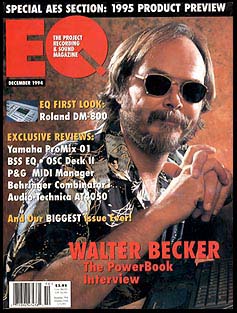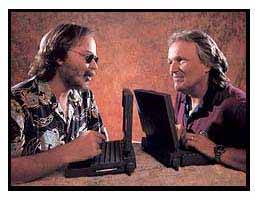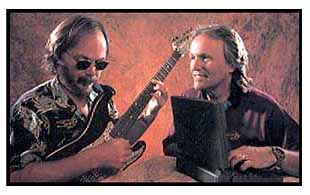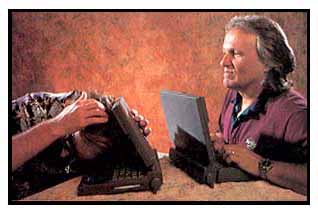

Originally appeared in EQ Magazine, December, 1994
 |
 |
| In preparation for the fall '94 release of 11 Tracks of Whack, Walter Becker's long awaited solo album, a punishing interview schedule is laid out through the months of August and September, during which time newspaper music editors from all over this great land of ours will each have their turn to ask the Artist 20 to 30 minutes worth of questions about his new career, his new album, this summer's Steely Dan tour, Donald Fagen, or whatever. These interviews are scheduled to coincide with the tour, for the most part; thus they must be squeezed in between shows and airplane flights and days off, making them doubly irritating to the hapless Artist. Plus, as the first week of interviews clearly shows, most of the writers will ask a completely predictable series of questions which can easily be anticipated, but which must answered again completely and honestly every single time. After a couple of sour sessions during which Becker consistently taunts and lies to his unfortunate interlocutor, he conceives of a brilliant alternative format which will provide consistently high quality interviews, no two quite the same, and which will free him from participating in these grueling sessions. After describing his scheme to longtime pal and engineer Roger Nichols, the digital maven agrees to build Becker the interview system of his dreams, based on a Mac Powerbook and a cellular phone. Here's how it works: |
|
A Journalist dials the supplied cellular phone number at the appointed hour. The line picks up and he hears:
Robovoice: Welcome to the Walter Becker 11 Tracks of Whack interview. Answers to the most commonly asked questions have been prerecorded for your journalistic convenience. If you would like to know why Walter Becker waited so long to record his first solo album, press 1 on your touchtone phone now. Journalist: Presses 1. Voice of Walter Becker: Well, I guess that through the seventies, when Donald and I were making Steely Dan records, I felt that Steely Dan was an utterly sufficient outlet for my creative talents, such as they were. Later on, when we finished Gaucho, Donald and I decided to go our separate ways for any number of valid reasons, and I myself felt that I was the victim of a typical career burnout and that I needed to do something different for a while. So I moved to Hawaii and didn't work in the music business for a couple of years. When I decided to go back to work, I wanted to keep my time commitment to working limited to a couple of months at a time, and I wanted to function in a role where I could forget about work completely when I came home...so I started producing records. I picked projects where I knew the length of the project would run no more than two or three months. I was successful in this way for a number of years. But after a while I found that I wasn't satisfied with the producer's role, and I decided to write some music and make my own record.
Voice of Roger Nichols: This is Roger Nichols, chief engineer for 11 Tracks of Whack and of all the Steely Dan albums and Donald Fagen's albums and also designer and builder of this automated interactive interview, and I will be making comments or clarifications from time to time, as a supplement to Walter's prerecorded answers. As far as I can tell, the real reason Walter decided to make a record was so's he could drag me and a bunch of great musicians over to Hawaii and make us admire and use all of his gear, of which he's got a hell of a lot, most of which he doesn't even know how it works or, in some cases, what it's for. That's why he got a record deal and made this record.
|
|
|
Robovoice: If you would like to know why 11 Tracks of Whack has twelve songs, press 2 now. Journalist: Presses 2. WB: Just a joke, really...think of it as a clerical error in your favor. Robovoice: If you would like to ask Walter what it was like writing songs by himself, without Donald, press 3 now. Journalist: Presses 3. WB: Well, it was lonely. But it got a little better as I went along, especially after I started calling the computer "Donald". |

|
|
RN: He made me go into ResEdit and change the name of "Vision 1.4"
to "Donald 1.4". What a jerk. He made me change the icon too. By the way, Walter doesn't know that I put these comments into the computer, so if you quote me in the piece it'll be a wonderful surprise for him when it comes out.
Robovoice: If you want to know how long it took to make the album, press 4 now. Journalist: Presses 4 WB: I guess it took about 18 months, with a couple of breaks for Steely Dan tours. I had originally hoped it would go much quicker, but you know what? It didn't. RN: How could it? We'd work on a track for maybe a couple of weeks, then Walter would decide he didn't like the song anyway. He'd make me time shift hundreds of hi hat notes in SoundTools, he'd get bored way before I was finished and go home, then he'd never listen to that track again. Every time he had to do anything with his synthes, he'd have to look it up in the manual, which as often as not he had left at his house, 45 minutes away from the studio. |

|
Robovoice: If you want to ask Walter if any of the new technology changed the way he worked on his album, as compared to the Steely Dan days, press 5 now. Journalist: Presses 5. WB: I would have to say that the most important difference had to do with writing on the computer. Because of the possibilities for manipulating the midi data on the sequencer program, I was able to write on the keyboard in a much more sophisticated way than would have been possible without it. I was able to maximize the effectiveness of my decidedly meager skills as a keyboard player and thus develop harmonic ideas that I would not have come up with on the guitar. |
|
RN: And which is why Walter, when he was asked by musicians what the chords to his songs were, had to go to the sequence and look at the midi notes on the tracks to figure out what was going on. Which is why nobody could agree what the correct names and chord functions of these bizarre clusters and voicings were, or even what key they were in, or in some cases where "1" was.
WB: Another big difference was that, back in the Seventies, our big problem was trying to get the tracks with live musicians to be steadier and more mechanically perfect and so on - whereas now, the big problem is trying to get the machine tracks to be more natural sounding and have more of the feel and variation of tracks played by real musicians. RN: Some people can't be helped by technology, or by anything else for that matter. They just like to complain. Robovoice: If you would like to find out why Walter's considerable talents as a vocalist have remained hidden until now, press 6 now. Journalist: Pause... Robovoice: If you want to ask Walter if there is ever going to be another Steely Dan album, press 7 now. Journalist: Presses 7, enthusiastically. WB: Well, you know, Donald and I have been working together a lot in these last couple of years and we've been thinking that we... RN: This is Sysops Roger Nichols and I would like to interrupt Walter's answer here for a moment to take a short and scientific survey. The question is this: let's say you have a couple of guys who have been working together off and on for twenty plus years, and these guys have been pretty successful with their recordings, both artistically and, well, financially successful too, I mean they've got plenty of dough and nice houses and cars and nice vacation houses which also have cars, nice cars that is, and let's say these two guys owe their artistic and, uh, financial success in no small measure to their brilliant and loyal recording engineer, who through the years has devoted most of his time and energy to their albums, has built all kinds of cool shit for these guys, computers and whatnot, without which they could not have done a lot of what they did...and let's say that this guy has been paid right along for his time and so on, but when you look at what's involved and how much these records have earned over the years, his salary, which he already spent years ago, looks like peanuts compared to the big picture. So the question is this: What would be an appropriate bonus for these two songwriter guys to give their loyal tech guy, as an acknowledgement of his twenty plus years of loyal brilliance? This is, mind you, coming on the heels of an extremely lucrative summer tour and all...If you think the appropriate bonus would be a nice Lexus ES 300, just like the one Walter's got in Hawaii, press 1. If you think this guy should get a poke in the eye with a sharp stick, press 2. If you think he deserves all of the above, press 3. |
|
Journalist: Presses 2.
RN: I hope you're not expecting to hear any more of Walter's answers... Journalist: Presses 1. RN: Good. Now let's see what Walter was saying about that new Steely Dan album. WB: [in mid sentence] ...so I guess that's what we're gonna do. Maybe. Or, you know, maybe not. Journalist: Hangs up. Originally appeared in EQ Magazine, December, 1994 |

|